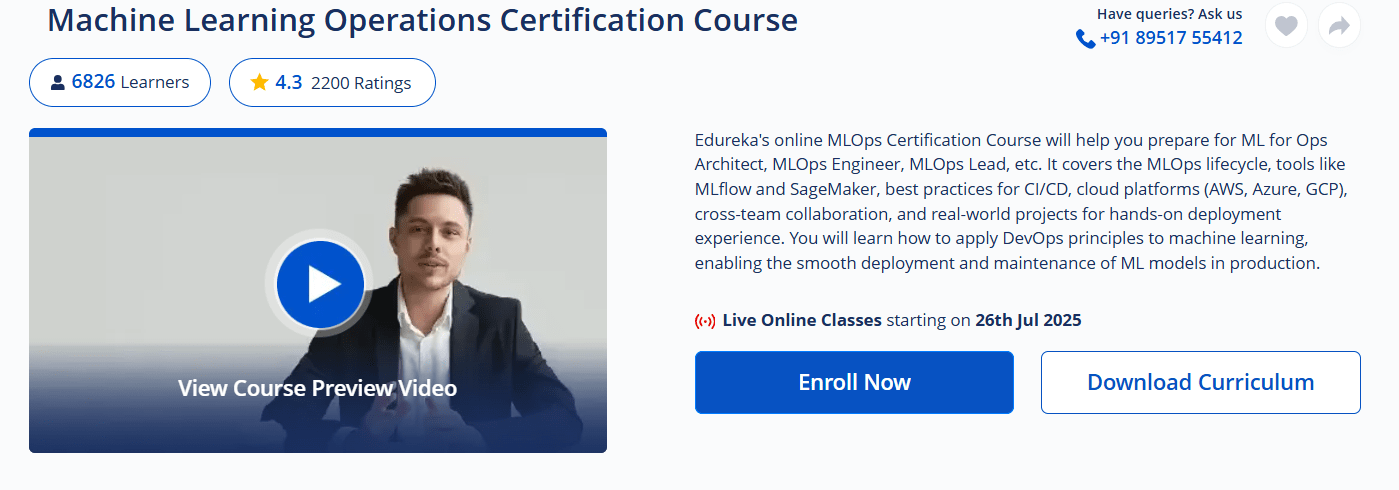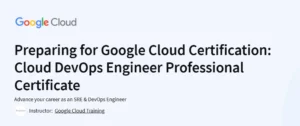What will you learn in Automation Testing using TestComplete 11.0 Course
Grasp the end-to-end MLOps lifecycle, from data preparation to model monitoring.
Containerize machine learning models using Docker and manage them with Kubernetes.
Build automated ML pipelines with tools like Airflow and Jenkins.
Implement CI/CD practices tailored for data and model versioning.
Monitor model performance in production and handle drift using Prometheus and Grafana.
Leverage feature stores and experiment tracking with MLflow or similar platforms.
Program Overview
Module 1: Introduction to MLOps & Architecture
⏳ 2 hours
Topics: MLOps principles, differences from DevOps, MLOps components.
Hands-on: Sketch an MLOps reference architecture and identify toolchain components.
Module 2: Version Control & Experiment Tracking
⏳ 2.5 hours
Topics: Git for code, DVC for data and model versioning, MLflow overview.
Hands-on: Track an experiment end-to-end with DVC and MLflow.
Module 3: Containerization with Docker
⏳ 3 hours
Topics: Docker images, Dockerfiles, best practices for ML workloads.
Hands-on: Containerize a trained model and run inference in a Docker container.
Module 4: Orchestration with Kubernetes
⏳ 3.5 hours
Topics: Kubernetes basics, pods, deployments, services, ConfigMaps and Secrets.
Hands-on: Deploy your Dockerized model on a local Kubernetes cluster.
Module 5: Building Automated Pipelines
⏳ 3 hours
Topics: Airflow DAGs, pipeline scheduling, retries, and monitoring.
Hands-on: Create an Airflow pipeline that ingests data, trains a model, and registers it.
Module 6: CI/CD for ML
⏳ 3 hours
Topics: Jenkins/GitHub Actions pipelines, automated testing of data and code.
Hands-on: Set up a CI/CD workflow that runs unit tests, trains, and deploys a model.
Module 7: Model Serving & APIs
⏳ 2.5 hours
Topics: Model serving frameworks (FastAPI, TensorFlow Serving), load balancing.
Hands-on: Expose your model as a REST API with Docker and test it with sample requests.
Module 8: Monitoring & Observability
⏳ 2.5 hours
Topics: Metrics collection, Prometheus exporters, Grafana dashboards.
Hands-on: Instrument your serving endpoint, collect metrics, and visualize them.
Module 9: Feature Store & Data Management
⏳ 2 hours
Topics: Concepts of feature stores, online vs. offline features, data cataloging.
Hands-on: Set up a simple feature store and retrieve features for inference.
Module 10: Capstone Project – End-to-End MLOps Pipeline
⏳ 4 hours
Topics: Combine all components to automate training, deployment, and monitoring.
Hands-on: Deliver a fully automated pipeline that retrains on new data and updates production.
Get certificate
Job Outlook
MLOps engineers are among the fastest-growing roles in AI, with salaries ranging $110K–$160K+.
Expertise in CI/CD, container orchestration, and model monitoring is highly sought by tech companies and enterprises embarking on AI projects.
Skills translate into roles such as MLOps Engineer, ML Platform Engineer, and AI Infrastructure Architect.
Growing freelance opportunities exist to build robust ML workflows for startups and consultancies.
Specification: Automation Testing using TestComplete 11.0
|





